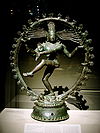Shiva Sahasranama

The Shiva Sahasranama (Sanskrit: शिवसहस्रनाम, romanized: śivasahasranāma) is a Sanskrit hymn that contains a list of the 1,000 names of Shiva, one of the principal deities of Hinduism and the supreme being in Shaivism. In Hindu tradition, a sahasranama is a type of devotional hymn (Sanskrit: stotram) listing the thousand names of a deity. The names provide an exhaustive catalog of the attributes, functions, and major mythology associated with the figure being praised. The Shiva Sahasranama is found in the Shiva Mahapurana, and many other scriptures, such as Linga Purana.
Variations
There are at least eight different variations of the Shiva Sahasranama[1] while the one appearing in the Book 13 (Anushasana Parva) of the Mahabharata is considered as the main version.[2] One version is contained in the Linga Purana, while another version occurs in the Mahabharata.
Krishna states the thousand names of Shiva to Yudhishthira in the 17th chapter of Anushāsanaparva in the epic Mahabharata.
- Linga Purana (version 1, LP 1.65.54-168) is close to the Mahabharata Anushasanaparvan version.
- Linga Purana (version 2, LP 1.98.27-159) has some passages in common with LP version 1, but also with other sources
- Shivapurana 4.35.1-131.
- Mahabharata (Anushasana Parva version). The critical edition of the Mahabharata has fewer than 1008 names similar to the Vishnu Sahasranama, it can be found in Chapter 1698(17) of the BORI Critical Edition. The Gita Press edition has all the verses which have been traditionally accepted and commented on.
- Mahabharata (Shanti Parva), Chapter 284 (Gita Press edition]]) also has a Shiva Sahasranama sung by Daksha to please Lord Rudra. This is not present in its complete from in the Critical Edition. This is also accepted by Traditional scholars.
- Vayu Purana (1.30.179-284) is almost the same as the Mahabharata Śāntiparvan version.
- Brahma Purana (38.1.1-100) is almost the same as the Vayu Purana version.
- Mahābhāgavata Upapurana (67.1-125).
References
- ^ Sharma, pp. viii-ix.
- ^ Mahabharata 13.17 translated by Kisari Mohan Ganguli (published between 1883 and 1896). This is the source for the version presented in Chidbhavananda, who refers to it being from the Mahabharata but does not explicitly clarify which of the two Mahabharata versions he is using. See Chidbhavananda, p.5.
External links

- Shiva Sahasranama in the Shiva Purana















